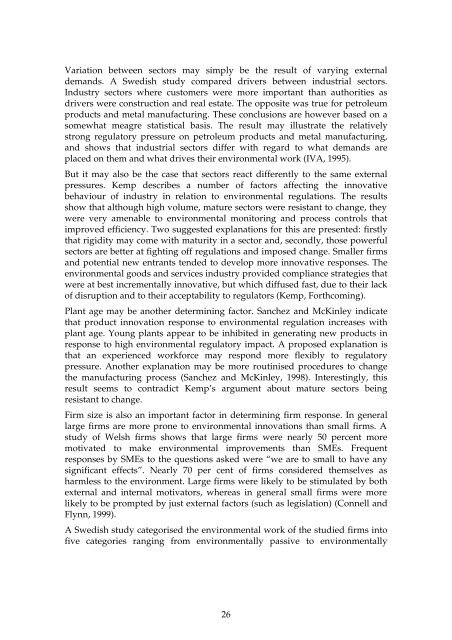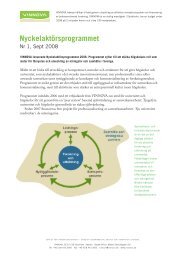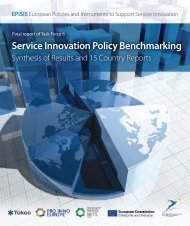Drivers of environmental innovation - Vinnova
Drivers of environmental innovation - Vinnova
Drivers of environmental innovation - Vinnova
Create successful ePaper yourself
Turn your PDF publications into a flip-book with our unique Google optimized e-Paper software.
Variation between sectors may simply be the result <strong>of</strong> varying external<br />
demands. A Swedish study compared drivers between industrial sectors.<br />
Industry sectors where customers were more important than authorities as<br />
drivers were construction and real estate. The opposite was true for petroleum<br />
products and metal manufacturing. These conclusions are however based on a<br />
somewhat meagre statistical basis. The result may illustrate the relatively<br />
strong regulatory pressure on petroleum products and metal manufacturing,<br />
and shows that industrial sectors differ with regard to what demands are<br />
placed on them and what drives their <strong>environmental</strong> work (IVA, 1995).<br />
But it may also be the case that sectors react differently to the same external<br />
pressures. Kemp describes a number <strong>of</strong> factors affecting the innovative<br />
behaviour <strong>of</strong> industry in relation to <strong>environmental</strong> regulations. The results<br />
show that although high volume, mature sectors were resistant to change, they<br />
were very amenable to <strong>environmental</strong> monitoring and process controls that<br />
improved efficiency. Two suggested explanations for this are presented: firstly<br />
that rigidity may come with maturity in a sector and, secondly, those powerful<br />
sectors are better at fighting <strong>of</strong>f regulations and imposed change. Smaller firms<br />
and potential new entrants tended to develop more innovative responses. The<br />
<strong>environmental</strong> goods and services industry provided compliance strategies that<br />
were at best incrementally innovative, but which diffused fast, due to their lack<br />
<strong>of</strong> disruption and to their acceptability to regulators (Kemp, Forthcoming).<br />
Plant age may be another determining factor. Sanchez and McKinley indicate<br />
that product <strong>innovation</strong> response to <strong>environmental</strong> regulation increases with<br />
plant age. Young plants appear to be inhibited in generating new products in<br />
response to high <strong>environmental</strong> regulatory impact. A proposed explanation is<br />
that an experienced workforce may respond more flexibly to regulatory<br />
pressure. Another explanation may be more routinised procedures to change<br />
the manufacturing process (Sanchez and McKinley, 1998). Interestingly, this<br />
result seems to contradict Kemp’s argument about mature sectors being<br />
resistant to change.<br />
Firm size is also an important factor in determining firm response. In general<br />
large firms are more prone to <strong>environmental</strong> <strong>innovation</strong>s than small firms. A<br />
study <strong>of</strong> Welsh firms shows that large firms were nearly 50 percent more<br />
motivated to make <strong>environmental</strong> improvements than SMEs. Frequent<br />
responses by SMEs to the questions asked were “we are to small to have any<br />
significant effects”. Nearly 70 per cent <strong>of</strong> firms considered themselves as<br />
harmless to the environment. Large firms were likely to be stimulated by both<br />
external and internal motivators, whereas in general small firms were more<br />
likely to be prompted by just external factors (such as legislation) (Connell and<br />
Flynn, 1999).<br />
A Swedish study categorised the <strong>environmental</strong> work <strong>of</strong> the studied firms into<br />
five categories ranging from <strong>environmental</strong>ly passive to <strong>environmental</strong>ly<br />
26

















